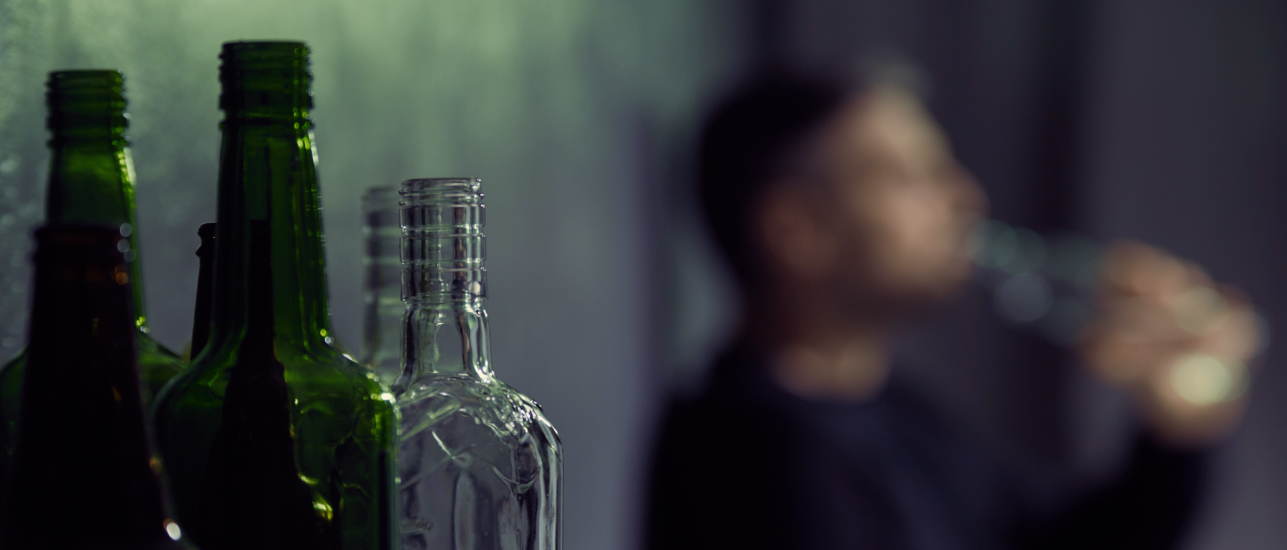Alcoholism is an immensely diverse disease that covers a broad spectrum of symptoms and personality types.
Currently a legal substance, alcohol; with all of its vastly addictive qualities and traits, make it easily one of the most common reasons individuals often seek out treatment options to begin with.
- Alcoholism Signs & Simptoms
- Alcohol Withdrawal Symptoms
- Drug Addiction
- Helping a Loved One
- Xanax Addiction Treatment
- Fentanyl Addiction Treatment
- Cocaine Addiction Treatment
- Heroin Addiction Treatment
- Opiate Addiction Treatment
- Opioid Addiction Treatment
- Meth Addiction Treatment
Drugs & Alcohol Abuse
In general, the term “alcoholism” encompasses all forms of habitual alcohol use, including: binge drinking, alcohol abuse, as well as alcohol addiction.
It is estimated that over 14.4 million Americans above the age of 18 easily meet criteria for an Alcohol Use Disorder. Below, The National Institute on Alcohol Abuse and Alcoholism offers a helpful list of questions to determine if you or a loved one may have an alcohol use disorder.
Alcoholism Statistics
According to the National Survey on Drug Use and Health (NSDUH), 85.6 % of Americans reported in 2019 that they drank alcohol at some point in their lifetime. Of that population, 69.5% reported drinking within the past year and 59.1% reported drinking within the past month. Additional alcoholism-related statistics are as follows:
25.8% of Americans in 2019 reported binge drinking within the past month
14.5 million Americans ages 18 and older had alcohol use disorder (AUD) in 2019
Less than 8% of people with alcohol use disorder sought treatment in 2019
Men experience alcoholism at higher rates than women
Alcohol adds to roughly 19% of emergency room visits
Alcohol contributes to 22% of all opioid overdose deaths
In 2015, alcohol was responsible for 29% of all driving-related deaths

Signs and Symptoms of Alcoholism
Because alcoholism can take on many forms, it can sometimes be difficult to recognize the signs and symptoms in ourselves or our loved ones. Obvious signs of alcoholism include frequent intoxication and hangovers. Other signs and symptoms may take behavioral, physical, and emotional form.
Behavioral Signs of Alcoholism
The abuse of any type of mind-altering substance is going to affect a person’s behaviors in one way or another. Unfortunately, the more that alcohol is abused, the more severe the behavioral consequences of that abuse can become. Some of the most common behavioral signs of alcoholism can include, but are not limited to, the following:

- Being secretive about whereabouts
- Isolating from others
- Continually engaging in risky behaviors despite the potential consequences
- Spending excessive amounts of money on alcohol
- Asking others for money frequently but never paying them back
- Having several legal problems as a result of drug or alcohol abuse
- Being unable to control how much alcohol is consumed
- Neglecting responsibilities at home in order to consume alcohol
- No longer participating in previously enjoyed activities or hobbies
Physical Signs of Alcoholism
The extent of the physical damage that alcohol addiction can do is typically directly related to a number of factors that include how often the abuse is occurring and how much is being used at a time. Similar to any other type of consequence of alcoholism, the more serious the alcoholism is, the faster physical symptoms can start to develop.
Someone who is addicted to alcohol can begin displaying any number of the following signs:
- Poor hygiene (e.g. not brushing teeth or hair, rewearing clothes several times without washing them, a general unkempt appearance)
- Changes in weight, which can include gaining or losing weight, as well as changes in appetite
- Problems with sleep patterns, such as sleeping too much or not enough
- Bloodshot eyes
- Development of withdrawal symptoms when not drinking (a sign of physical dependence)
- Increased tolerance for alcohol, meaning that more needs to be consumed at a time in order to develop a sense of being under the influence
- Flushed, swollen appearance in the face
- Yellowish tint to the skin (a sign of liver dysfunction)
- Skin appearing dull and grayish due to dehydration

Emotional Signs of Alcoholism
Emotions can be difficult to deal with even if you are not abusing alcohol. But if you are addicted to alcohol, you will face emotional challenges. Ranging from pervasive sadness and hopelessness to euphoria and excitability, the emotions that can be produced by alcohol use can fluctuate over and over again. And, of course, being under the influence of alcohol can impair and inhibit you from being able to manage your emotions appropriately.
Frequently experienced emotional signs of alcoholism include the following:

- Irritability
- Sudden, unexplained changes in mood
- Anxiety, panic, or fear
- Depression
- Feeling unable to function without alcohol
- Turning to the use of alcohol in order to cope
- Suicidal thoughts, tendencies, or behaviors
Again, the signs and symptoms of alcoholism are typically related to the severity of the individual’s alcohol consumption. The more severe the drinking patterns, the more complex and apparent the signs and symptoms become.
How is Alcoholism Treated
Alcoholism is a complex disease, as it impacts a person’s physical, psychological, and emotional wellbeing. In order to treat alcoholism effectively, several options for care are provided so that each individual alcoholic looking to recover can have their own unique needs met.
The type of treatment a person will receive for alcoholism can depend on a number of different factors, including but not limited to, the following:
- The severity of their alcoholism
- If they are abusing other mind-altering substances simultaneously
- If they are experiencing one or more mental health conditions
- How many times they have attended treatment before (if applicable)
When these factors are determined, the proper treatment plans can be developed for each individual. For many, the very first part of their treatment is detox. Detox is the process of clearing the body and mind of any and all mind-altering, addictive substances. Someone who is dependent on alcohol is going to develop withdrawal symptoms when they stop drinking. Those symptoms can range in severity from headaches and nausea to seizures and high blood pressure. There is no real, effective way to know how intense one’s withdrawal from alcohol will be, which is why it is important to go through this process in a professional detox center. There, medical and mental health professionals can provide on-the-spot care if and when it is needed. As soon as the process of detox is completed, individuals can move into the therapeutic portion of their care, which may be provided through one of the following levels of treatment:
Inpatient treatment, where the individual resides at the treatment facility and stays for 30-90 days depending on their needs. This form of treatment is the best choice for those with a severe case of alcoholism or who have made previous attempts to get sober before but have been unable to stop drinking.
Partial hospitalization programs (PHPs), where the individual continues to live at home but spends the majority of their time at the facility. This is ideal for those who require medical assistance on a regular basis while they are in obtaining treatment.
Intensive outpatient programs (IOPs), a program for those who can live on their own but who also need consistent treatment while they work on establishing themselves in recovery.
Outpatient treatment, where the individual is spending the majority of their time on their own, but also engaging in treatment one to several times per week based on their treatment plan.
Within each level of treatment, individuals participate in evidence-based therapies, such as cognitive behavioral therapy, individual therapy, group counseling, etc. They work to develop skills to address triggers, prevent relapse, and improve communication. When individuals complete their treatment, they can continue to work on their recovery through aftercare services provided by the facility, which oftentimes includes regular meetings and alumni events.
Rehab for Alcoholism in Florida
At Genesis House, we understand the need for rehab for alcoholism in Florida, as we work with people every single day who can benefit from the services we provide. We know that making the choice to go to rehab is not easy, but we also know that it is worth it.
When you attend our rehab for alcoholism in Florida, you can rest assured that you will be getting the best treatment possible for your specific condition. You will have access to medical detox services if needed as well as therapies and educational classes that will give you all the tools you need to sustain your recovery for the long haul.
At our rehab for alcoholism in Florida, you can trust us to help you get back on your feet and then some. All you need to do is reach out and ask for help.

In the past year, have you or a loved one:
It is not uncommon for individuals to acknowledge that they have had times when they consumed more alcohol or extended their drinking beyond their intended limits. This behavior often indicates a loss of control over their alcohol consumption, which can be indicative of alcohol dependency or addiction.
Recognizing these patterns and behaviors is an essential step in understanding the challenges associated with addiction. At Genesis House Addiction Recovery Treatment Center, we specialize in helping individuals regain control over their lives and overcome their addiction.
Our comprehensive treatment program addresses the physical, psychological, and emotional aspects of addiction. We have a team of experienced professionals who are dedicated to providing personalized care and evidence-based therapies tailored to each individual’s unique needs. By addressing underlying issues, developing coping skills, and fostering a healthier lifestyle, we empower individuals to achieve long-term sobriety.
If you or someone you know has experienced instances where drinking has exceeded intended limits, it may be time to seek professional help. Genesis House Addiction Recovery Treatment Center offers compassionate care and guidance to individuals struggling with alcohol addiction. We are here to support you on your journey towards a brighter and healthier future.
It is not uncommon for individuals struggling with alcohol addiction to express a desire to cut down or stop drinking but find it difficult to do so. This difficulty in achieving and maintaining sobriety despite genuine attempts is often a sign of alcohol dependency or addiction.
At Genesis House Addiction Recovery Treatment Center, we understand the challenges associated with alcohol addiction and the importance of providing comprehensive support to individuals seeking recovery. Our treatment program is designed to address the physical, psychological, and emotional aspects of addiction to help individuals break free from the cycle of alcohol dependency.
By engaging in our program, individuals will have access to a team of experienced professionals who specialize in addiction recovery. Through personalized care and evidence-based therapies, we aim to assist individuals in developing the necessary tools and strategies to overcome the obstacles that hinder their ability to cut down or stop drinking.
It is important to remember that seeking help is a courageous step towards reclaiming control over one’s life. If you or someone you know has expressed a desire to cut down or stop drinking but has been unable to do so, we encourage you to reach out to Genesis House Addiction Recovery Treatment Center. Our compassionate team is dedicated to guiding individuals towards lasting sobriety and a brighter future.
Spending a significant amount of time drinking or dealing with the aftereffects of alcohol consumption is a common experience for individuals struggling with alcohol addiction. Excessive drinking can consume a substantial portion of one’s time and energy, affecting various aspects of life, including personal relationships, work or school commitments, and overall well-being.
At Genesis House Addiction Recovery Treatment Center, we understand the impact that alcohol addiction can have on an individual’s life. Our comprehensive treatment program is designed to address not only the physical aspects of addiction but also the psychological and emotional factors that contribute to excessive drinking and its aftereffects.
Through our personalized approach, individuals receive the necessary support to overcome the challenges associated with alcohol addiction. Our experienced professionals offer evidence-based therapies, counseling, and other effective interventions to help individuals break free from the cycle of excessive drinking and regain control over their lives.
If you or someone you know has spent a significant amount of time engaged in drinking or has experienced prolonged periods of sickness or aftereffects from alcohol consumption, it may be an indication of an underlying alcohol addiction. We encourage you to reach out to Genesis House Addiction Recovery Treatment Center for compassionate care and expert guidance on the journey towards recovery and a healthier, more fulfilling life.
Experiencing intense cravings or a strong need to drink is a common characteristic of alcohol addiction. Cravings can manifest as overwhelming urges to consume alcohol and can be triggered by various factors, including stress, environmental cues, emotional states, or social situations associated with drinking.
At Genesis House Addiction Recovery Treatment Center, we recognize the power of cravings and their role in addiction. Our treatment program is designed to address cravings and provide individuals with the tools and strategies necessary to manage and overcome them.
Through personalized care and evidence-based therapies, our experienced professionals work with individuals to identify the underlying causes of cravings and develop healthy coping mechanisms. This includes learning alternative ways to deal with stress, managing triggers, and developing effective strategies to navigate challenging situations without turning to alcohol.
By addressing cravings and providing comprehensive support, our aim is to empower individuals to break free from the cycle of alcohol addiction and regain control over their lives. If you or someone you know has experienced strong cravings or a compelling urge to drink, reaching out to Genesis House Addiction Recovery Treatment Center can provide the guidance and support needed to overcome addiction and achieve lasting recovery.
It is not uncommon for alcohol addiction to have a significant impact on various aspects of an individual’s life, including their ability to fulfill responsibilities at home, maintain healthy relationships, perform well in their jobs or studies, and take care of their family.
At Genesis House Addiction Recovery Treatment Center, we understand the detrimental effects that alcohol addiction can have on one’s personal and professional life. Our comprehensive treatment program aims to address these challenges by providing individuals with the necessary support and tools to regain stability and restore balance.
Through personalized care, counseling, and evidence-based therapies, our experienced professionals work with individuals to address the underlying issues contributing to alcohol-related interference. By developing coping mechanisms, improving communication and relationship skills, and enhancing problem-solving abilities, individuals can rebuild their lives and overcome the negative consequences of alcohol addiction.
If alcohol consumption has interfered with your ability to take care of your home or family, caused job troubles, or resulted in school-related problems, it may be an indication of an underlying alcohol addiction that requires professional help. We encourage you to reach out to Genesis House Addiction Recovery Treatment Center, where our compassionate team is dedicated to guiding individuals towards recovery, healing, and a brighter future.
Continuing to drink despite experiencing trouble within family or friend relationships is a common characteristic of alcohol addiction. Alcohol addiction can strain relationships and cause conflicts due to behavioral changes, unreliability, neglect, and other negative consequences associated with excessive drinking.
At Genesis House Addiction Recovery Treatment Center, we recognize the impact that alcohol addiction can have on personal relationships. Our treatment program focuses not only on overcoming alcohol dependency but also on repairing and rebuilding relationships that may have been affected.
Through individual and family therapy, our experienced professionals work with individuals and their loved ones to address the underlying issues contributing to relationship difficulties. We provide guidance on effective communication, rebuilding trust, setting healthy boundaries, and developing coping strategies to repair and strengthen family and friend connections.
It is essential to seek help and support to break the cycle of alcohol addiction and heal relationships that have been strained. If you find that your drinking has caused trouble within your family or friendships, reaching out to Genesis House Addiction Recovery Treatment Center can provide the necessary assistance and guidance in overcoming addiction and fostering healthier, more fulfilling relationships.
Giving up or significantly reducing activities that were once important, interesting, or enjoyable in order to prioritize drinking is a common sign of alcohol addiction. As addiction takes hold, individuals may find themselves sacrificing hobbies, passions, social engagements, and other meaningful activities to make room for excessive alcohol consumption.
At Genesis House Addiction Recovery Treatment Center, we understand the impact that alcohol addiction can have on one’s overall quality of life. Our treatment program is designed to help individuals rediscover their interests, regain a sense of purpose, and restore a healthy balance in their lives.
Through therapy, counseling, and personalized care, our experienced professionals work with individuals to address the underlying reasons behind the prioritization of alcohol over meaningful activities. By developing healthier coping mechanisms, exploring new interests, and fostering a renewed sense of purpose, individuals can regain control over their lives and reintegrate fulfilling activities into their daily routines.
If you have noticed that you have given up or significantly cut back on activities that were once important, interesting, or pleasurable due to drinking, it may be an indication of an underlying alcohol addiction. Seeking help at Genesis House Addiction Recovery Treatment Center can provide the necessary support and guidance to break free from addiction and rediscover a fulfilling, balanced life.
Engaging in risky behaviors while under the influence of alcohol is a common occurrence for individuals struggling with alcohol addiction. Alcohol impairs judgment, coordination, and decision-making abilities, which can lead to engaging in dangerous activities that increase the risk of harm or injury.
At Genesis House Addiction Recovery Treatment Center, we understand the potential dangers associated with alcohol-related risky behaviors. Our treatment program focuses on helping individuals overcome their addiction and develop healthier coping strategies to avoid such high-risk situations.
Through therapy, counseling, and education, our experienced professionals work with individuals to address the underlying factors that contribute to engaging in unsafe behaviors while or after drinking. We emphasize the importance of personal safety and provide tools and techniques to make informed decisions, manage cravings, and avoid situations that may put individuals at risk.
If you have found yourself in situations while or after drinking that increased your chances of getting hurt, such as driving under the influence, swimming, using machinery, walking in dangerous areas, or engaging in unsafe sex, it is crucial to seek professional help. Genesis House Addiction Recovery Treatment Center is here to provide compassionate care, support, and guidance in overcoming alcohol addiction and creating a safer, healthier future.
Continuing to drink despite experiencing symptoms of depression, anxiety, or worsening health conditions is a common behavior among individuals with alcohol addiction. Alcohol can temporarily alleviate these symptoms, leading individuals to rely on it as a coping mechanism. However, in the long run, alcohol exacerbates these mental health issues and can contribute to the deterioration of physical health.
At Genesis House Addiction Recovery Treatment Center, we understand the complex relationship between alcohol addiction and mental health. Our treatment program addresses the co-occurring disorders, providing integrated care for both addiction and mental health issues.
Through a combination of therapy, counseling, and specialized treatment approaches, our experienced professionals help individuals develop healthier coping mechanisms to manage depression, anxiety, and other mental health challenges. We also provide medical support and resources to address any physical health concerns exacerbated by alcohol addiction.
Additionally, if someone has experienced memory blackouts or gaps in memory after drinking, it can be a sign of excessive alcohol consumption and potential alcohol-related brain damage. Our program offers cognitive rehabilitation and support to address memory and cognitive impairments associated with alcohol addiction.
If you have been drinking despite experiencing depression, anxiety, worsening health conditions, or memory blackouts, seeking help is essential. Genesis House Addiction Recovery Treatment Center is dedicated to providing comprehensive care to address both the addiction and any co-occurring mental or physical health issues, helping individuals achieve long-term recovery and improved overall well-being.
Developing a tolerance to alcohol, where one needs to consume increasingly larger amounts to achieve the desired effect, is a common characteristic of alcohol addiction. Over time, the body adapts to the presence of alcohol, requiring higher quantities to produce the same level of intoxication or desired effects.
At Genesis House Addiction Recovery Treatment Center, we understand the development of tolerance and its implications for alcohol addiction. Our treatment program addresses the physical and psychological aspects of addiction, including tolerance and its associated risks.
Through personalized care and evidence-based therapies, our experienced professionals help individuals understand the underlying mechanisms of tolerance and work towards breaking the cycle of escalating alcohol consumption. By addressing the factors contributing to increased alcohol intake, we aim to support individuals in regaining control over their drinking habits and achieving sobriety.
It is important to recognize the signs of tolerance and the diminishing effects of alcohol consumption. If you have noticed that you need to drink much more than before to achieve the desired effect or that your usual number of drinks has a significantly reduced impact, it may be an indication of an underlying alcohol addiction. Seeking help at Genesis House Addiction Recovery Treatment Center can provide the necessary guidance, support, and strategies to overcome addiction and achieve lasting recovery.
Experiencing withdrawal symptoms when the effects of alcohol wear off is a common indicator of alcohol dependence or addiction. Withdrawal symptoms can manifest both physically and psychologically and can range from mild discomfort to severe complications.
At Genesis House Addiction Recovery Treatment Center, we recognize the significance of alcohol withdrawal and the potential risks associated with it. Our treatment program includes a comprehensive approach to managing and minimizing withdrawal symptoms in a safe and supportive environment.
Our experienced professionals are trained to assess and monitor withdrawal symptoms, providing medical intervention when necessary. We offer personalized care, including medication-assisted treatment and therapies to alleviate discomfort and manage the physical and psychological challenges of withdrawal.
Withdrawal symptoms may include trouble sleeping, shakiness, irritability, anxiety, depression, restlessness, nausea, sweating, and even hallucinations or sensing things that are not there. These symptoms can be effectively managed through a combination of medical supervision, therapy, and support.
If you have experienced withdrawal symptoms when alcohol effects wear off or have sensed things that were not there, it is crucial to seek professional help. Genesis House Addiction Recovery Treatment Center provides a safe and supportive environment to navigate the challenges of withdrawal and embark on a path of lasting recovery. Our dedicated team is here to guide you through the process and help you achieve a healthier, more fulfilling life.



